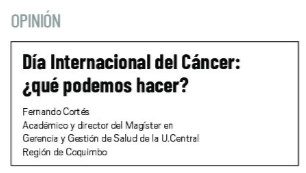Source: Diario El Día 01/27/2025
Every February 4th, International Cancer Day is observed with the aim of raising awareness and mobilizing individuals, communities, and governments in the fight against one of the greatest public health challenges of our time. In 2025, the theme “Closing the Care Gap” invites us to reflect on the inequalities in access to early detection, treatment, and palliative care.
Cancer does not discriminate—it affects people of all ages, genders, and socioeconomic backgrounds. However, statistics reveal an unequal reality. While high-income countries report significantly higher survival rates thanks to advanced technology and robust healthcare systems, in low-resource regions, economic and structural limitations can turn a diagnosis into a death sentence.
In Chile, cancer is the leading cause of death, surpassing cardiovascular diseases in some regions. According to the Ministry of Health, the most common types of cancer are stomach, lung, breast, prostate, and colorectal cancer. This distribution reflects genetic factors, social determinants, and behavioral influences, such as unequal access to healthcare, dietary habits, and exposure to carcinogens. The country’s epidemiological transition and aging population partly explain this trend, but they also highlight the structural challenges faced by the Chilean healthcare system. For instance, there are significant geographical inequalities—while Santiago concentrates most specialized centers, in regions such as Aysén and Arica y Parinacota, patients must travel long distances to receive treatment.
Prevention is a powerful yet underutilized tool. The World Health Organization (WHO) estimates that 40% of cancer cases could be prevented through lifestyle changes and public health measures. These include reducing tobacco consumption, promoting a healthy diet, increasing physical activity, and vaccinating against cancer-related infections, such as human papillomavirus (HPV) and hepatitis B.
Despite scientific and technological advancements, significant challenges persist in research, funding, and equity. Innovative treatments such as immunotherapy and personalized medicine have revolutionized the prognosis of some cancers, but their high costs make them inaccessible to millions of people. This highlights a major issue in healthcare systems: ensuring that progress is not a privilege for a few, but a right for all.
International Cancer Day is also an opportunity to recognize the essential role of caregivers, who often face immense emotional, physical, and financial burdens. Supporting these silent heroes is just as crucial as caring for patients.
On this day, it is vital to remember that every action counts. From community initiatives promoting education and early detection to individual decisions that foster health and well-being, we can all contribute to changing the course of this disease. More importantly, we must urge governments and international organizations to redouble their efforts to close healthcare gaps and build fairer, more resilient health systems.
To read the full article on the newspaper’s website, visit:
http://www.impreso.diarioeldia.cl/papel-digital/diario-dia-27-01-2025
